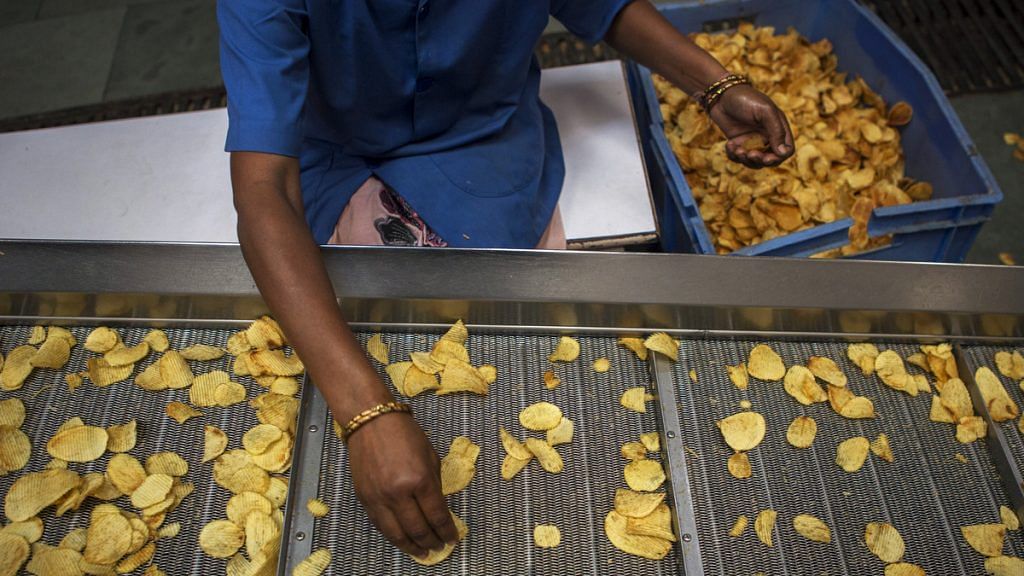There should be little in common between Ahmed Patel and Tajinder Pal Singh Bagga. The former is a Congressman of Congressmen, a pragmatic centrist in a party whose top leaders have socialist convictions. The latter is a young hot-headed spokesman of Narendra Modi’s BJP, a party that has persuaded many people that it is the opposite of Left. So far apart are they on the political spectrum that it is difficult to imagine that they would agree on anything at all. But yet, they do.
Last week, after PepsiCo took a few Gujarati farmers to court for, allegedly, illegally growing its proprietary potatoes, Patel tweeted: “Pepsi’s decision to take Gujarat’s potato grower farmers to court is ill-advised & brazenly wrong. It is in violation of the farmers right under PPVFR Act. The state govt shouldn’t keep its eyes shut. Corporate interest cannot dictate what our farmers must or mustn’t cultivate.” Far from opposing his centre-Left political adversary, Bagga outdid him. “I am giving ultimatum to @PepsiIndia to withdrawn Cases against Indian Farmers in Next 72 Hours otherwise we will Start Campaign to Boycott All @PepsiCo Products in India. Your time starts now,” Bagga warned. Nitin Patel, Gujarat’s deputy chief minister announced that the state government will include itself into the case in support of the farmers.
The Lok Sabha elections are underway and farmers issues are particularly important now, and PepsiCo doesn’t have a vote. So, it is understandable that political parties want to be seen as being pro-farmer. But it is not only a matter of opportunistic political parties — most people are likely to instinctively side with the farmers than with the multinational corporation. David vs Goliath, poor Indian farmers vs evil foreign corporation, and all that. Our moral instincts are at work here, and the fast brain decides right and wrong within a fraction of a second, leaving the slow brain to rationalise the already-made decision.
Also read: At the heart of potato farmer’s Rs 490 ‘gift’ to Modi, a crisis in India’s aloo mandi
It is at such times, when normally-disagreeing political parties are falling over themselves to do the same popular thing, that we must be very careful.
From what has been reported in the media, the farmers had — knowingly or unknowingly — planted FC5, a variety of potato that is registered to PepsiCo under the Protection of Plant Varieties and Farmers’ Rights Act. The potato in question is not an indigenous or traditional variety. It was developed in the United States and PepsiCo introduced it to Indian farmers as part of its corporate and collaborative farming ventures. The firm registered the variety with the Protection of Plant Varieties and Farmers’ Rights Authority (PPVFRA) in 2016. Given that the potatoes are the core ingredient of its Lay’s chips product, it is not surprising that it would want to protect its business interests. Based on this, while extremely unpopular and inopportune, it is extremely difficult to conclude that PepsiCo was “wrong” to protect its rights.
Suppose a big MNC was not involved, and that one farmer had grown a variety that had formally been registered by another. Suppose it was David vs David. Would we arrive at the same conclusion? Now, there are some who believe that seeds shouldn’t be intellectual property at all. If there are no property rights, there cannot be any theft, so it does not matter if Farmer A took the seeds from Farmer B or from an MNC.
However, we do not live in such a world. India’s laws attempt to balance promoting innovation and protecting farmers’ rights. It would be as much an offence if Farmer A took from his/her neighbour or from PepsiCo.
Also read: PepsiCo agrees to settle potato cultivation case with 4 farmers
Those rushing to defend a few farmers against PepsiCo are perhaps unaware that as of October 2018, it was individual farmers who registered the highest number of plant varieties. Out of 3,504 certificates issued by the PPVFRA,1,587 were issued to individual farmers/communities, 1,143 to state agricultural universities/public research organisations, and only 774 to private companies. This is good news, as it shows the farmers and farming communities are not only recognising the value of protecting their innovations, but are able to register them with the government.
Low agricultural productivity is at the root of India’s economic problems: We cannot address the chronic agrarian distress unless we are able to raise productivity levels. To double farmers’ real incomes, we must double their productivity. This means we need higher yielding varieties, different farming models, better rural infrastructure and fixing market imperfections to ensure farmers get better returns. PepsiCo is part of the solution, because it has introduced better farming techniques to the country. As are individual farmers and communities who develop better varieties of crops.
Also read: Indian farmers need a new deal and not just loan waivers
If we want to help our farmers, we should build a robust intellectual property system that rewards innovators, protects traditional rights and has broad social acceptance. Given that India has a globally competitive biotech industry, millions of vulnerable farmers and a growing middle class, balancing the legitimate interests of all stakeholders will be hard. The PPVFR Act might be imperfect, but it cannot be anyone’s argument that we should condone its violation. Like in many other areas of public policy, the right thing is not popular, and the popular thing is not right.
The author is the director of the Takshashila Institution, an independent centre for research and education in public policy. Views are personal.
